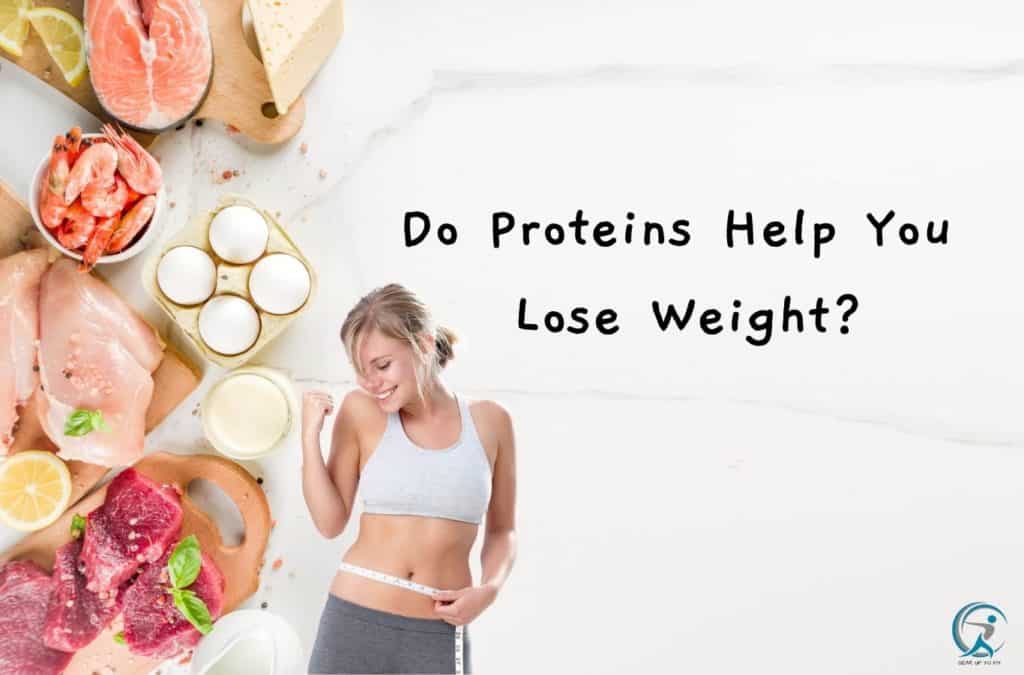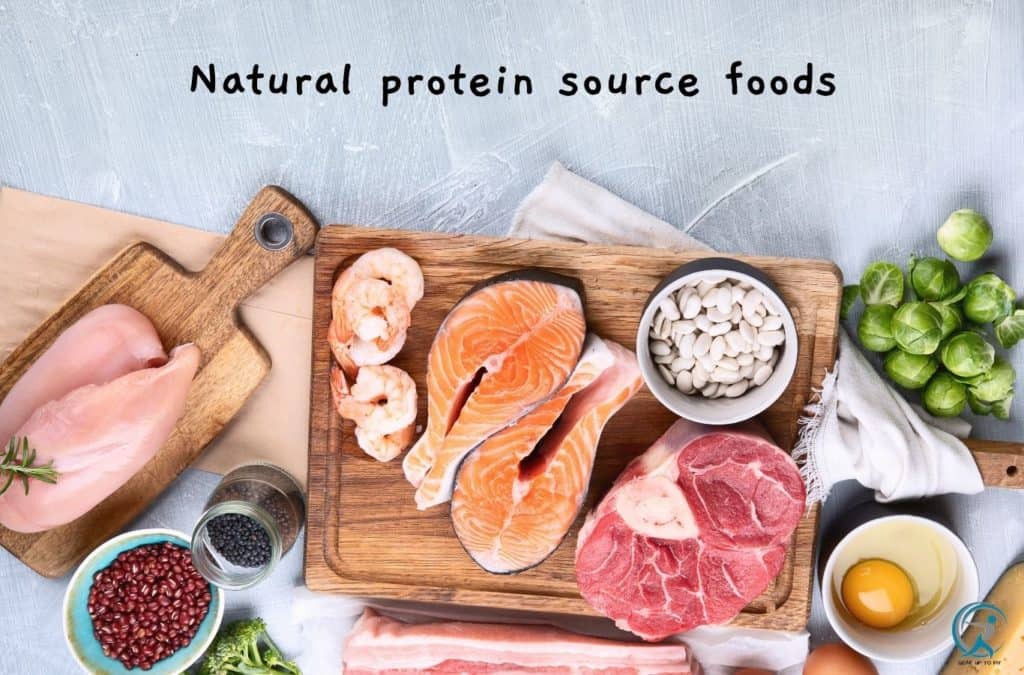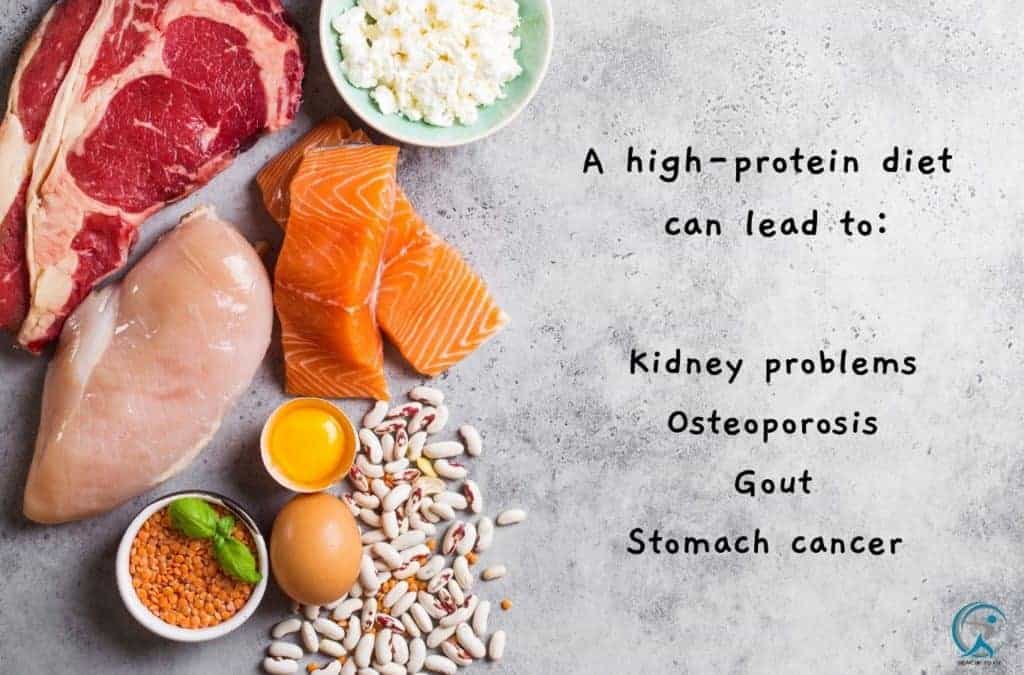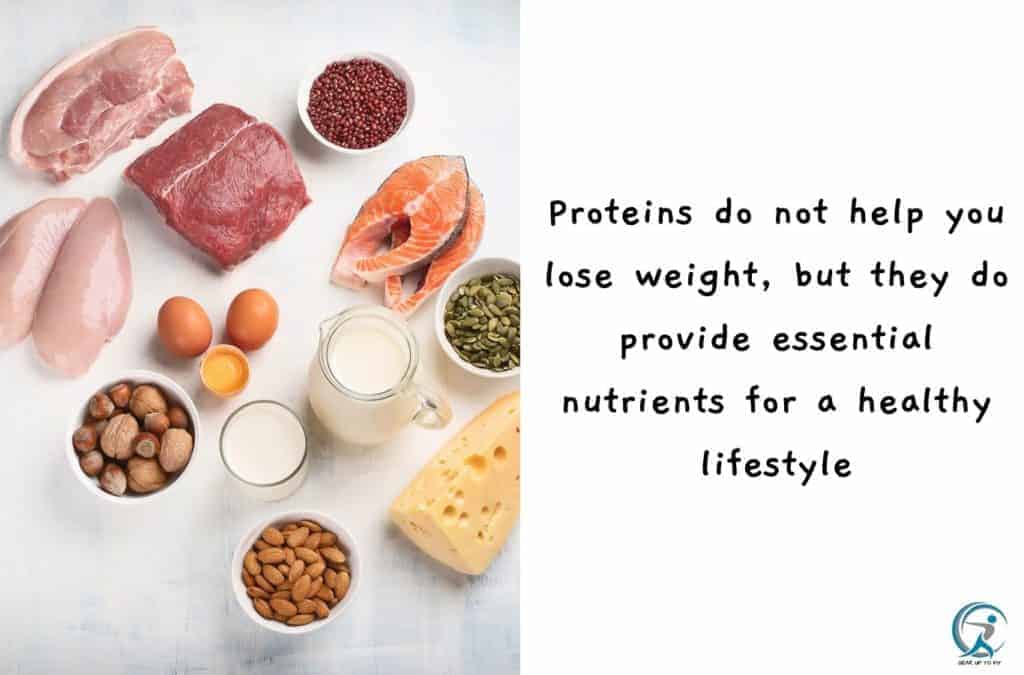The relationship between protein intake and weight loss is often misunderstood. This comprehensive guide examines the scientific evidence behind protein’s role in weight management and provides practical recommendations for incorporating protein into a healthy diet.
This science-based guide will demystify the role of proteins in weight loss, explain how a high protein diet can aid your journey, and provide practical tips to boost your weight management efforts.
Key Takeaways:
- Essential Macronutrient: Proteins are vital for muscle growth, immune function, and overall health.
- Weight Loss Aid: High protein increases fullness, preserves muscle mass, and boosts calorie burn.
- Intake Guidelines: Consume 1.2 to 1.6 grams of protein per kilogram of body weight for effective weight loss.
- Quality Sources: Include animal (chicken, fish) and plant proteins (legumes, nuts) in your diet.
- Balance Risks: Avoid excessive protein to prevent kidney strain and heart disease.
- Practical Tips: Start meals with protein and opt for protein-rich snacks or supplements as needed.
Understanding Proteins and Their Importance

What Are Proteins?
Proteins are essential macronutrients composed of building blocks called amino acids. There are 20 different amino acids, and nine of them are considered essential amino acids because our bodies can’t produce them—we must obtain them from our diet.
Role of Proteins in the Body
Proteins play a crucial role in:
- Muscle protein synthesis: Building and repairing muscles
- Supporting immune function
- Enzymatic reactions
- Transporting molecules throughout the body
Including adequate dietary protein is vital for maintaining overall health and lean muscle mass.
How Proteins Affect Weight Loss

Increased Satiety and Reduced Calorie Intake
Eating protein-rich foods can increase feelings of fullness, leading to reduced calorie intake. Proteins take longer to digest compared to carbohydrates, which helps you feel satisfied for longer periods.
Boosting Metabolism through the Thermic Effect of Food
Proteins have a higher thermic effect than fats and carbohydrates. This means your body burns more calories digesting proteins—a process that can aid in fat loss.
Preserving Muscle Mass During Weight Loss
When you’re losing weight, it’s important to preserve muscle mass. Adequate protein intake supports muscle retention, which can prevent a decrease in metabolic rate associated with muscle loss.
How Much Protein Do You Need?
Recommended Protein Intake
According to dietary guidelines, the Reference Nutrient Intake (RNI) for protein is:
- 0.75 grams per kilogram of body weight for adults
However, for those aiming for weight loss or involved in regular physical activity, higher protein intakes may be beneficial.
Calculating Your Protein Needs
Here’s how to calculate your protein needs:
- Determine your body weight in kilograms.
- Multiply your weight by the recommended grams of protein.
Example:
- Body weight: 70 kg
- Protein needs: 70 kg × 1.2 g/kg = 84 grams of protein per day
High Protein Diet Recommendations
For weight loss, a high protein diet might recommend:
- 1.2 to 1.6 grams of protein per kilogram of body weight
Learn more about personalized workout plans
Best Protein Sources
Animal Proteins
Animal proteins are considered high-quality because they contain all essential amino acids.
- Lean Protein: Chicken breast, turkey, lean beef
- Fish: Salmon, tuna (rich in omega-3 fatty acids)
- Dairy: Greek yogurt, cottage cheese
- Eggs
Plant Proteins
Plant proteins can also contribute significantly to your protein intake and are often lower in saturated fat.
- Legumes: Lentils, chickpeas, black beans
- Nuts and Seeds: Almonds, chia seeds
- Whole Grains: Quinoa, brown rice
- Soy Products: Tofu, tempeh
Comparison of Protein Sources
| Protein Foods | Serving Size | Protein Content (g) | Notes |
|---|---|---|---|
| Chicken Breast | 100g | 31 | Lean, high protein |
| Salmon | 100g | 25 | Contains healthy fatty acids |
| Lentils (cooked) | 1 cup | 18 | Great plant protein source |
| Greek Yogurt | 170g | 17 | High in protein, contains probiotics |
| Tofu | 100g | 8 | Plant-based, versatile |
| Almonds | 28g | 6 | Good for snacking, healthy fats |
Explore healthy vegan diet plans
The Role of High Protein Diets in Weight Management
Benefits of a High Protein Diet
A high protein diet can:
- Reduce hunger and cravings
- Support fat loss while preserving lean muscle mass
- Enhance satiety, leading to consuming fewer calories
Protein and Body Composition
By supporting muscle mass and reducing fat, adequate protein intake can improve your overall body composition.Discover how to balance cardio and strength training
Potential Drawbacks and Considerations

Excess Protein Intake
Consuming extra protein beyond your needs doesn’t necessarily lead to more weight loss and may strain the kidneys over time.
Saturated Fat Concerns
Some animal protein sources can be high in saturated fat, which is linked to heart disease. Opt for lean meats and incorporate plant proteins.
Protein Deficiency Risks
While rare in developed countries, inadequate protein intake can lead to protein deficiency, affecting muscle mass and immune function.Learn how to avoid common fitness mistakes
Expert Insights
Dr. Emily Roberts, Clinical Nutritionist
“Protein plays a vital role in weight management. It aids in satiety and helps maintain muscle mass during weight loss. Incorporating a balance of protein sources is key for optimal health.“
Latest Research
- A 2023 study published in the Journal of Clinical Nutrition found that participants on a high protein diet lost more weight and maintained more lean muscle mass compared to those on a standard protein diet1.
- Research from 2022 indicates that increasing protein intake can enhance metabolism and promote fat loss without significant changes in calorie intake2.
Practical Tips for Including Protein in Your Diet

- Start Your Day with Protein: Incorporate eggs or Greek yogurt into your breakfast.
- Choose Protein Snacks: Opt for nuts, seeds, or a small protein shake.
- Balance Your Meals: Ensure each meal contains a source of protein, complex carbohydrates, and healthy fats.
- Try Plant Proteins: Include more legumes and tofu for a diverse intake.
- Consider Protein Supplements: If needed, a protein powder like whey protein can help meet your protein needs.
Check out these high-protein snack ideas
Frequently Asked Questions
Can a high protein diet help with weight loss?
Yes, a high protein diet can aid in weight loss by increasing satiety, boosting metabolism, and preserving muscle mass.
Does higher protein intake lead to weight loss?
Increasing protein intake can lead to weight loss as it helps you feel full and may reduce overall calorie intake.
Is animal protein better than plant protein?
Both animal protein and plant protein have their benefits. Animal proteins are complete proteins, while plant proteins offer fiber and other nutrients.
How much protein should I consume daily for weight loss?
Aim for 1.2 to 1.6 grams per kilogram of body weight. Adjust based on activity level and consult a healthcare provider.
Can protein supplements help in weight loss?
Protein supplements like whey protein can help meet your protein needs but should complement a balanced diet.Discover the best protein powders for muscle gain
Conclusion
Proteins play a significant role in weight loss and overall weight management. By helping you feel full, boosting your metabolism, and preserving lean muscle mass, adequate dietary protein supports your health and fitness goals. Remember to choose a variety of protein sources and maintain a balanced diet for optimal results.
References
- Ping Wang, C. Holst, M. R. Andersen, A. Astrup, F. Bouwman, Sanne van Otterdijk et al. Blood Profile of Proteins and Steroid Hormones Predicts Weight Change after Weight Loss with Interactions of Dietary Protein Level and Glycemic Index. 2011. PLoS ONE.
- L. Azadbakht, Vajihe Izadi, P. Surkan, Ahmad Esmaillzadeh. Effect of a High Protein Weight Loss Diet on Weight, High-Sensitivity C-Reactive Protein, and Cardiovascular Risk among Overweight and Obese Women: A Parallel Clinical Trial. 2013. International Journal of Endocrinology.
- J. Moon, G. Koh. Clinical Evidence and Mechanisms of High-Protein Diet-Induced Weight Loss. 2020. Journal of Obesity & Metabolic Syndrome.
As a veteran fitness technology innovator and the founder of GearUpToFit.com, Alex Papaioannou stands at the intersection of health science and artificial intelligence. With over a decade of specialized experience in digital wellness solutions, he’s transforming how people approach their fitness journey through data-driven methodologies.